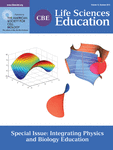Competency-Based Reforms of the Undergraduate Biology Curriculum: Integrating the Physical and Biological Sciences
Abstract
The National Experiment in Undergraduate Science Education project funded by the Howard Hughes Medical Institute is a direct response to the Scientific Foundations for Future Physicians report, which urged a shift in premedical student preparation from a narrow list of specific course work to a more flexible curriculum that helps students develop broad scientific competencies. A consortium of four universities is working to create, pilot, and assess modular, competency-based curricular units that require students to use higher-order cognitive skills and reason across traditional disciplinary boundaries. Purdue University; the University of Maryland, Baltimore County; and the University of Miami are each developing modules and case studies that integrate the biological, chemical, physical, and mathematical sciences. The University of Maryland, College Park, is leading the effort to create an introductory physics for life sciences course that is reformed in both content and pedagogy. This course has prerequisites of biology, chemistry, and calculus, allowing students to apply strategies from the physical sciences to solving authentic biological problems. A comprehensive assessment plan is examining students’ conceptual knowledge of physics, their attitudes toward interdisciplinary approaches, and the development of specific scientific competencies. Teaching modules developed during this initial phase will be tested on multiple partner campuses in preparation for eventual broad dissemination.



